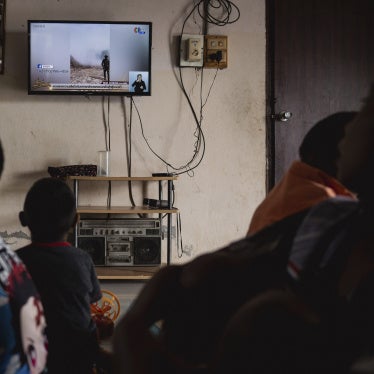(CNN) -- Like thousands of other female applicants to Indonesia's National Police, 24-year-old Sari (not her real name) submitted to the mandatory "virginity test" that the authorities require women -- but not men -- to take as part of the application process.
In a police hospital in the city of Makassar in 2008, Sari says that she and 20 other fellow police recruits were told to undress, lie down on a table and allow a physician to perform a "two-finger test." Six years later, Sari says she is still traumatized. "I feared that after they performed the test I would not be a virgin anymore. It really hurt. My friend even fainted because...it really hurt, really hurt."
Indonesia's National Police have imposed these abusive and degrading tests on thousands of female applicants since as early as 1965, despite the fact that they contravene National Police principles that recruitment must be both "nondiscriminatory" and "humane." Meanwhile, the tests have been recognized internationally as a violation of human rights, particularly the prohibition against "cruel, inhuman or degrading treatment" under article 7 of the International Covenant on Civil and Political Rights and article 16 of the Convention against Torture, both of which Indonesia has ratified. Indeed, last month, the World Health Organization stated unambiguously that "There is no place for virginity (or 'two-finger') testing; it has no scientific validity."
Indonesia's National Police can't feign ignorance of the tests, nor the opposition to them within police ranks. High Commissioner Sri Rumiati, a police psychologist who now teaches at the Graduate School of Police Sciences in Jakarta, underwent the virginity test in 1984 and subsequently advocated for their abolition. Those efforts prompted colleagues in police recruitment teams in 2010 to defend "virginity tests" as a means of preventing "prostitutes joining the police."
Indonesia's National Police has responded to Human Rights Watch's exposure of this abusive practice with defiance. A senior police official, Inspector General Moechgiyarto, on November 18 confirmed that the National Police required the test for female applicants. But rather than condemning the practice and promising its abolition, Moechgiyarto defended it as a means to ensure the "high moral standards" of the police and reportedly suggested that failure of the test was simply proof that applicants were sex workers.
"If she [a candidate) turns out to be a prostitute, then how could we accept her for the job?" he said.
There also are alarming indications that the use of virginity tests extends to other parts of Indonesia's security forces. On November 19, Indonesia's Coordinating Minister for Politics, Law and Security, Tedjo Edhi, told reporters that such tests have long been obligatory for female military recruits as well.
Sadly, this isn't the first time that Indonesian government officials have advocated such tests for women.
In August 2013, H.M. Rasyid, education chief of Prabumulih district in Indonesia's south Sumatra, reportedly sought to impose mandatory "virginity tests" on female high school students to tackle perceived problems of "premarital sex and prostitution." After Indonesian civil society organizations attacked Rasyid's proposal as "against human rights" and then-Indonesian Education Minister Mohammad Nuh, skewered the idea as "degrading and discriminatory," Rasyid backed off, insisting that he had been misquoted by domestic media.
But that same month, the semi-official Indonesian Ulema Council in East Java urged the local government to impose "virginity tests" as a requirement for all girls entering the city's high schools.
"Virginity tests" and the Indonesian government's tolerance of such abusive practices are not an isolated attack on women's rights. Instead, they are but one of many far wider-reaching abuses of constitutionally-guaranteed women's rights that have been occurring across the country in recent years. One of the most obvious of those violations is a growing number of discriminatory regulations -- more than 300 -- imposed by local governments since 1999. They range from local bylaws requiring women to wear the hijab to a local government's prohibition against women from dancing. The failure of Indonesia's central government in protecting women's rights is symbolized by the stalled passage of a gender equality bill which has been in draft form since 2009.
Former President Susilo Bambang Yudhoyono, who left office in October after a decade in office, deserves a portion of the blame for the erosion of basic rights of women and girls. Yudhoyono is seen by many as having traded political support from the Indonesian Ulama Council, Indonesia's top Muslim clerical body, for a commitment to backing fatwas.
Such government tolerance for abuses of women's rights must end. President Joko Widodo, who replaced Yudhoyono in October, has an opportunity to send an unambiguous message in the first weeks of his administration that he will not ignore women's rights or undermine them for political gain. Widodo can begin by instructing the National Police to prohibit "virginity tests" and ordering local governments to abolish local regulations that violate constitutionally-guaranteed women's rights.
These moves would send a much-needed message that the government and its security forces are committed to protecting the rights of women, rather than violating them.








